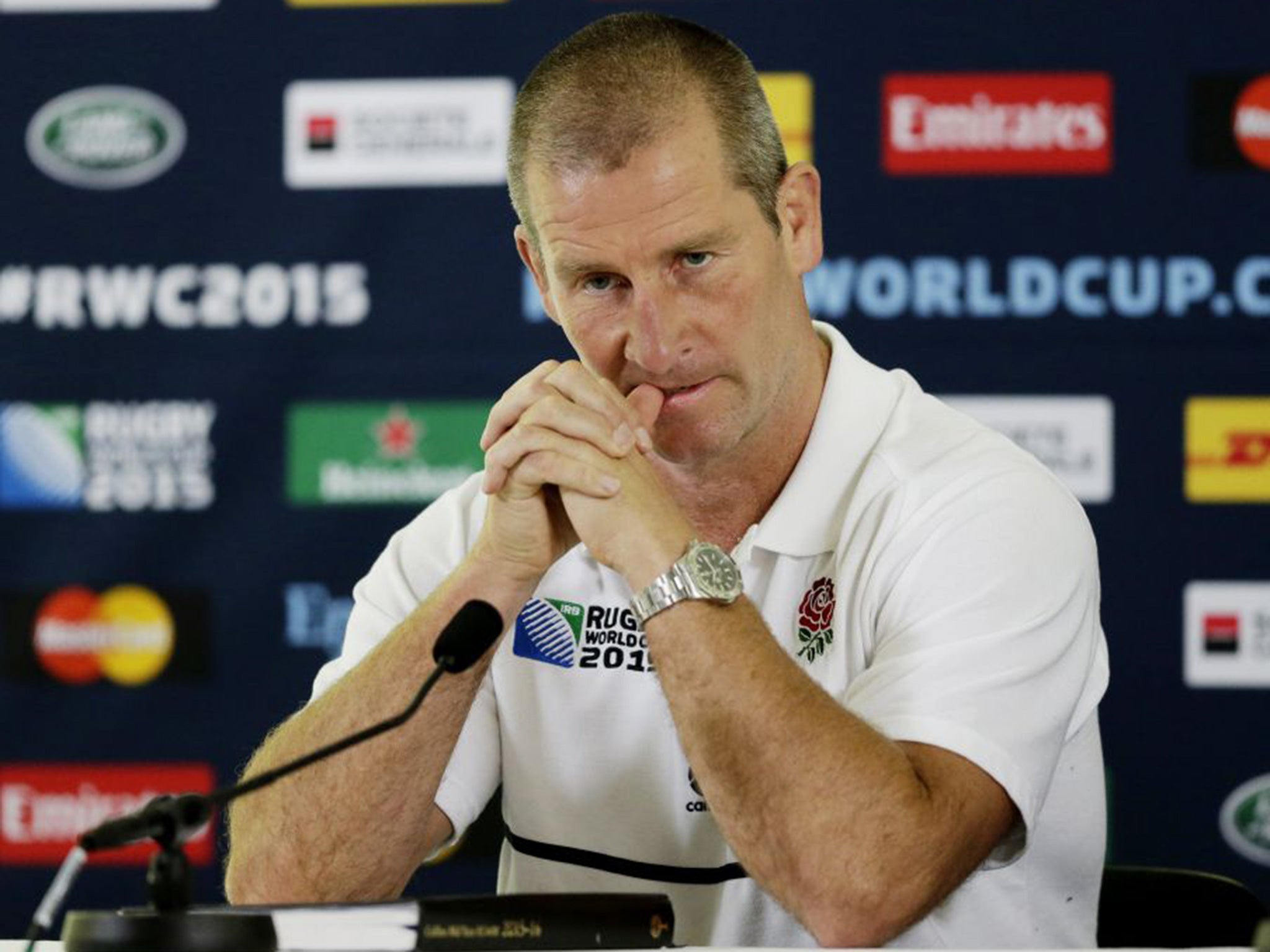RWC 2015: I’ll never come to terms with England exit, says Stuart Lancaster
There were long minutes of utter desolation as the coach reflected on the defeats by Wales and Australia

Your support helps us to tell the story
From reproductive rights to climate change to Big Tech, The Independent is on the ground when the story is developing. Whether it's investigating the financials of Elon Musk's pro-Trump PAC or producing our latest documentary, 'The A Word', which shines a light on the American women fighting for reproductive rights, we know how important it is to parse out the facts from the messaging.
At such a critical moment in US history, we need reporters on the ground. Your donation allows us to keep sending journalists to speak to both sides of the story.
The Independent is trusted by Americans across the entire political spectrum. And unlike many other quality news outlets, we choose not to lock Americans out of our reporting and analysis with paywalls. We believe quality journalism should be available to everyone, paid for by those who can afford it.
Your support makes all the difference.The immediate inquest into England’s failure to survive the pool stage of their own World Cup threw up a thousand questions about Stuart Lancaster’s future as head coach that were never likely to be answered. But in one mournful moment of gut-wrenching honesty, Lancaster lifted the veil on his own emotional state by admitting: “I don’t think I’ll ever come to terms with this.”
Sitting alongside him was Ian Ritchie, the chief executive of the Rugby Football Union and the man who, only last year, awarded Lancaster and his back-room team – Andy Farrell, Graham Rowntree and Mike Catt – contract extensions taking them beyond the 2019 World Cup. Ritchie was in full “no hasty decisions” mode and with good reason. It will take him almost as long to get his head round these events and the accompanying collateral damage as it will take Lancaster to recover from them.
If the CEO could hardly have been less illuminating on the subject of what happens next other than a “review”, Lancaster was more forthcoming. He refused to be drawn on his next career move, but he gave a hint of his current thinking by saying: “Family is a big thing. I’m not going to make a personal decision in public, but that consideration will be part of the final equation.”
There were long minutes of utter desolation as the coach reflected on the defeats by Wales and Australia that ended England’s interest in this competition and are likely to cost the governing body millions of pounds in commercial revenue. Shortly after Ritchie’s pronouncement that everyone involved in the game would have to “work hard to mitigate what we may have lost out on”, Lancaster acknowledged that the buck stopped with him.
“I’m the head coach and we didn’t get out of the pool,” he said. “I’m accountable. It’s going to sit with us all for ever – players, coaches, management – but speaking personally, I don’t think I’ll ever come to terms with this because it’s such a big thing.
“I’ve had some great moments with England and some disappointing ones, but everything else pales into insignificance because of what the tournament means to everyone. That will be the overriding emotion for a long time, I think.
“I’m very lucky in that I’ve had some good support either side of me. I look at all the logistics and planning for this World Cup and when I compare it to the 2011 tournament,
“I see a very strong structure in place. I see good players who have been developed by good coaches in a good environment. But we lost two games, crucial games, and that’s how we’ll be judged. I understand that.”
Besides the flint-hearted process of ridding themselves of those coaches no longer considered relevant – Ritchie acknowledged that a “no change” policy was not an option – and a recalculation of the RFU’s financial projections as a result of bowing out so early, the people at the top of the governing body are keen to avoid two further calamities.
Firstly, they do not want this soap opera to become a rival attraction to a World Cup still being hosted by England, hence the insistence that there will be no rush to blame. Second, they want to ensure there is no repeat of the fall-out from 2011, when the warts-and-all detail of a review into the team’s poor performance on the field and whollyobjectionable one off it ended up in the public domain.
You can see their point. There has been enough embarrassment already.
Join our commenting forum
Join thought-provoking conversations, follow other Independent readers and see their replies
Comments